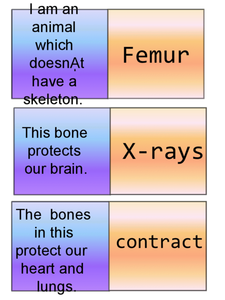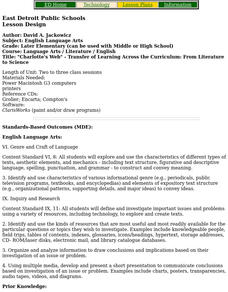Curated OER
Feed Me, Seymour
Students work in small groups to create posters illustrating the major facts and functions of plant organs. Within their groups, they assume the role of specialists creating specialized posters pertaining to the different parts of plants.
Curated OER
How Does the Cardiovascular System Work?
Learners explore the basic anatomy and functions of the cardiovascular system. They identify parts of the cardiovascular system according to the levels of organization. In addition, they trace the path of a blood cell through the...
Curated OER
Study Guide-Skeletal System
In this skeletal system worksheet, high schoolers answer 16 questions about the functions of the skeletal system, the groups of bones that make up the skeletal system, the parts of the bones, the joints, the components of the bones and...
Curated OER
Circulation
Students define the functions of the circulatory system. In this body circulation lesson students see how engineers have involvement with the circulatory system.
Curated OER
Fun Bones
Use the hokey pokey music to teach the names of some of the major bones in the human body. Circle up, put on the music, and put your right radius in. Use this in an anatomy class to spice things up a bit!
Curated OER
Anatomy Card Game
Print these cards to play any number of games as a way to practice human anatomy vocabulary. There are 20 cards, 10 contain definitions or clues and 10 contain the answers to those clues. They could be used to play memory, a jigsaw...
Curated OER
Integumentary System: A System, An Organ, the Biggest!
It is only six short slides, but an acceptable outline of the integumentary system. General facts about the system, layers, sublayers, and functions are listed as bullet-points. What would make this presentation more engaging for your...
Curated OER
H2O in Us
Students discover through this activity that all organisms are composed of water. They find that 70 percent of their bodies are made up of water that is in thier cells and blood, and not free-flowing throughout their body.
Curated OER
Tissues: Word Search
In this word search worksheet, students discover words related to the human body and various types of tissue in it. Terms include all parts of the body.
Curated OER
"Charlotte's Web" - Transfer of Learning Across the Curriculum: From Literature to Science
Students research and write about the parts of a spider's body using educational software. They draw spiders using computer software.
Columbus City Schools
You Can’t Sneeze On This Tissue
Take your class' understanding of cells to the next level... or levels! Demonstrate the levels of organization using a variety of engaging methods. The teacher's guide includes the materials you'll need to execute a flower dissection,...
Curated OER
Pump It Up!
Young scholars design a pumping device that will effectively pump fluid through a model "cardiovascular system." They explore the effects of too much and too little pressure on a circulatory system.
Curated OER
Enzymes Help Us Digest Food ~ Introduction to Sugars and Enzymes
After an explanatory introduction to sugars and enzyme activity, biochemists discover whether lactase is needed to digest lactose, sucrose, and milk as a whole. High school science lab skills are required for these investigations.
Baylor College
What Is a Neuron?
Your class won't get on your nerves while doing this modeling activity! After teaching the structure and function of a neuron using the included diagrams, give individuals some clay and chenille stems so that they can make their own...
Baylor College
Heart and Lungs
With a partner, youngsters measure their pulse and breathing rates, both at rest and after running in place for a minute. While this activity is not novel, the lesson plan includes a large-scale classroom graphing activity and other...
Curated OER
Unlocking the Endocrine System
Fifth graders use an analogy to the mail delivery system to study the workings of the human endocrine system. They discover the interrelationships between the human body systems while comparing them to engineering communicating with...
Curated OER
Blood
In this blood learning exercise, students describe the four functions of blood. Then they write what each part of the human body illustrated does below the picture. Students also complete the table on possible blood types of a receiver...
Curated OER
The Body of Human Rights
Students, in groups, draw a life-size outline of a person on paper. They then place each article of the Universal Declaration of Human Rights on a part of the body, writing the number of the article in the appropriate place (e.g.,...
Curated OER
Human Rights Education Handbook: Image Theater
Students create a human machine to represent a concept related to human rights such as opression, liberation, justice. They make one machine per group, adding one person with a repeating sound and motion at a time.
Curated OER
What's Your Angle?
Third graders read the story, Magic Schoolbus Inside the Human Body. Then they form right, acute, and obtuse angles using the joints inside their bodies. They write a brief summary about what they learned about angles as a review the...
Curated OER
Digestive System (Online Interactive)
For this digestive system worksheet, students read a 7 paragraph text to learn the functions of the digestive system. Students then answer 10 multiple choice questions. This is an online interactive worksheet.
Curated OER
Skeletal Flash Cards
In this skeletal system worksheet, students are given 19 diagrams of different bones or parts of the skeletal system. They label all the structures of each bone or set of bones such as the skull and use the flashcards to study the parts.
Curated OER
Digestion and Nutrition
In this digestion worksheet, students will review a diagram showing the parts of the digestive system and the length of the intestines. Students will complete 3 short answer questions based on the diagram.
Curated OER
Physical vs. Chemical Changes
In this chemical reactions learning exercise, students read about the differences between physical and chemical changes in substances. Then students identify situations as either an example of physical or chemical change. Students learn...
Other popular searches
- Human Body Parts Pictures
- Human Body Parts
- Spanish Human Body Parts
- Human Body Parts Edible
- Human Body Parts Bingo
- Main Human Body Parts
- The Human Body Parts
- Human Body Parts Photographs
- Human Body Parts Worksheet
- Pics Human Body Parts
- Human Body Parts Names
- Human Body Parts Poster

























